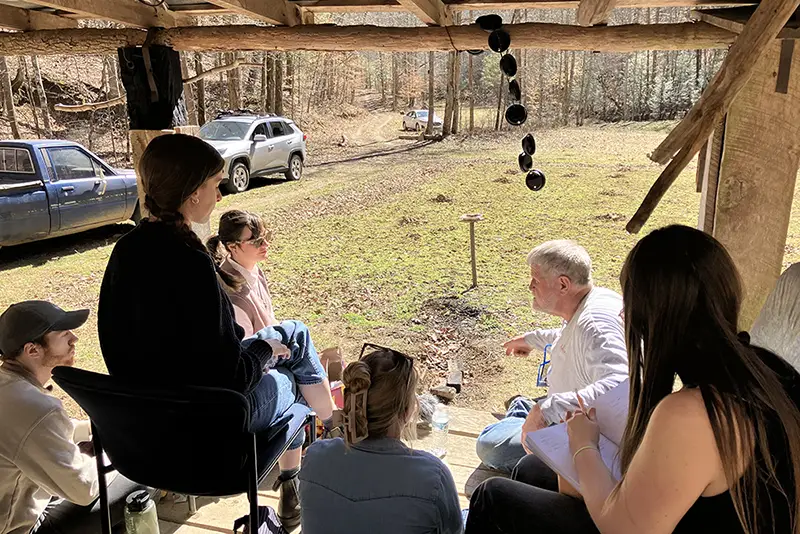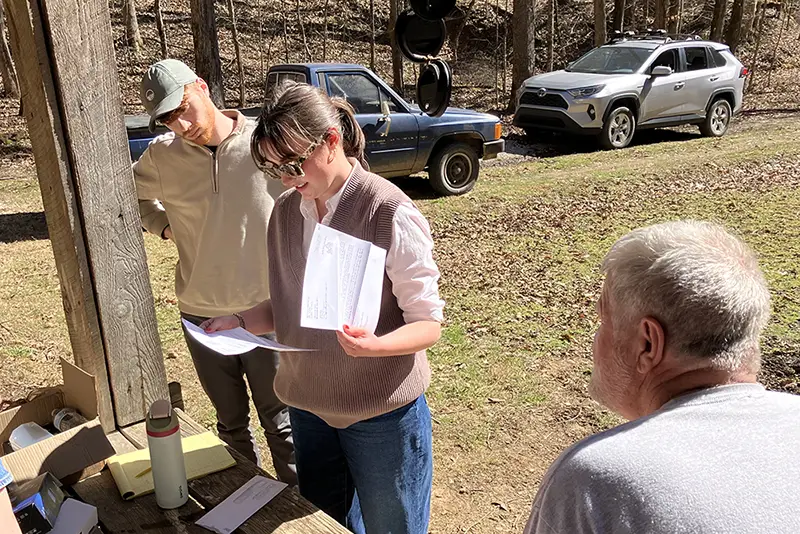Building Justice Through Community Connections

The Appalachian Justice Research Center connects with regional communities to help resolve complex legal questions and transform lives.
UT’s Appalachian Justice Research Center (AJRC) brings together skills and resources from the College of Arts and Sciences and the Winston College of Law to help solve urgent and historically under-addressed issues affecting people across East Tennessee and the Appalachian region.
Vol faculty and students in the AJRC embody UT’s land grant mission to make life and lives better in Tennessee, engaging their passion for helping others through research and training projects that advance community visions for a more just and equitable Appalachia and the Mountain South.

College of Law Professor Wendy Bach and Department of Sociology Professor Michelle Brown co-direct the center, guiding collaborative projects with Appalachians whose own experiences bring forth pressing issues for justice in their communities.
“There are currently 12 research projects underway with over a dozen community partner organizations and more than 20 faculty at the helm,” said Bach. “We have 48 affiliated faculty involved in AJRC from more than 19 colleges and departments including the social sciences, natural sciences, architecture, education, social work, nursing, and law.”
In addition, more than 90 undergraduate, graduate, and law students from over 25 disciplines have engaged in the Appalachian Justice Research Lab (AJRL) course since it began in fall 2024. Students gain a well-rounded perspective of the complexities and challenges of justice work.
“Students in the lab course gain valuable experience in conducting research and applying solutions that directly support the needs and priorities of Appalachian communities,” said Brown. “They also have the opportunity to earn their undergraduate minor or graduate certificate in justice studies.”
The AJRC focuses on four research themes that address priorities shared by regional partners: community safety, land justice, housing and community stability, and health justice.
“The AJRC is supporting community needs that involve consideration of legal concerns that weigh on livelihoods and well-being,” said Mike Blum, associate dean for research and creative activity in the college. “This is a great example of how the university is meeting its land grant mission.”
The People and the Land: Navigating Heirs’ Property Complications

One major project investigates property-inheritance complications in rural communities, connecting the expertise of AJRC faculty and students directly with the experiences of Tennesseans. “Heirs’ property” refers to land that is jointly owned by descendants of someone who died without leaving a will. The multiple heirs are left without a clear title to the property, which can lead to family disputes and potential loss of the land.
“Heirs’ property leaves the people who live on the land and those that want to invest in these properties in a bind,” said Gabe Schwartzman, assistant professor in the Department of Geography and Sustainability. “Without a clear title, it’s risky to invest and live on this land.”
It can make families and individuals vulnerable to predatory investors who might exploit the title complexities to take the land.
“People who live and work on land tied up in heirs’ property issues may lose ownership, may get evicted, and cannot access loans and financing that most landowners can receive,” said project member Lucy Jewel, Joel A. Katz Distinguished Professor of Law in UT’s Winston College of Law.
With funding from a UT Grand Challenge grant, a multi-disciplinary AJRC team of lawyers, social scientists, a landscape architect, and community partners developed plans for hosting clinics to educate landowners about writing wills and the distribution of legal resource guides through county extension offices.
“We’re giving community members a resource guide for how to navigate the legal process,” said Schwartzman. “That could be invaluable for individuals that are in the dark on the process and sometimes end up spending a lot of money on lawyers before they even understand the situation that they are in.”
For students, being able to apply their coursework to help the people of Tennessee nurtured a sense of responsibility and connection to rural histories, challenges, and possibilities—and gave them opportunities to share their Volunteer Spirit in big ways.
“It was deeply rewarding to witness the connections students formed with the community,” said Scottie McDaniel, assistant professor in landscape architecture. “Beyond interviews and workshops, many joined instructor Gabe Schwartzman in helping an aging resident of Clearfork plant sorghum, and the full oral-history lab cohort celebrated alongside the community at the opening of its first public hiking trail in May. These experiences went beyond research—they offered students a lived understanding of rural life and land stewardship.”
By Randall Brown